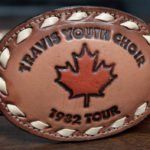Posted: 6/06/03
Navy chaplain will ask messengers
to overturn NAMB policy on women
By Craig Bird & Greg Warner
Associated Baptist Press
ATLANTA (ABP)–The Southern Baptist Convention's shift to endorsement of female chaplains only if they are not ordained seriously undermines the spiritual effectiveness of all ordained military chaplains, according to one of the Navy's top chaplains.
Capt. Al Hill, a lifelong Southern Baptist and a 25-year veteran chaplain, said June 3 that a motion will be presented at the June 17-18 Southern Baptist Convention to reverse the policy now practiced by the North American Mission Board, the SBC's chaplain-endorsing agency.
| “Regardless of Capt. Hill's views of ordination, most Southern Baptists do not consider ordination necessary for ministry,” –NAMB spokesman Martin King |
The policy, approved by NAMB trustees in February, permits women to be endorsed as chaplains in the military and elsewhere only if they are not ordained. The policy is aimed at appeasing conservative critics who oppose the ordination of women. Rather than not appointing any female chaplains, as some would prefer, NAMB contends ordination is not necessary for chaplains.
“Regardless of Capt. Hill's views of ordination, most Southern Baptists do not consider ordination necessary for ministry,” said NAMB spokesman Martin King.
Hill, director of the training and education division in the Navy Chief of Chaplains Office, met for two hours May 28 with John Yarbrough, NAMB vice president for evangelization–a meeting the chaplain said was conducted in “a spirit of graciousness and openness.” Hill said he left the meeting optimistic NAMB trustees would reconsider their February action, which he said is opposed by most Baptist chaplains in the Navy.
Instead, Hill said June 3, the trustees' chaplains commission declined a recommendation from Yarborough to place the issue on the agenda of the full trustee board meeting in October. Members of the commission said they would discuss the issue further at their August meeting and decide if it would be placed on the October agenda, Hill said, but that is too long to wait.
“I am surprised and disappointed,” Hill said. “They may or may not choose to recommend full board action, but waiting to find out is an unacceptable option. Their decision makes it necessary to present a motion on the floor of the convention in two weeks that will force the trustees to address the issue before the next convention.”
King, the NAMB spokesman, said the agency's policy was designed to honor the SBC's opposition to women pastors while not eliminating ministry by women.
“The North American Mission Board supports women in chaplaincy in positions that are not the equivalent of a senior pastor,” King said. “We renew our pledge to stand with any female Southern Baptist chaplain who is discriminated against because she is not ordained.”
But Hill and others say the NAMB policy is impractical. In the armed services, the position of chaplain cannot be separated from the role of pastor, Hill said, and neither can female chaplains minister exclusively to female soldiers and families, as one NAMB trustee suggested.
Moreover, “to endorse anyone who has not been ordained is to proclaim the ordination of all Southern Baptist military chaplains as unnecessary and irrelevant,” Hill added. “It is to strip all of us–in one stroke–of the sign and seal of our spiritual authority as ministers of the gospel of Jesus Christ, and to do this to us while we labor in a vineyard more difficult to harvest than any local Southern Baptist church, where the infrastructure acknowledges and enhances the spiritual authority of the pastor.”
The NAMB policy does not intersect well with military culture, Hill said.
By law, there are no positions of senior pastoral leadership that are “off-limits” to women military chaplains, he pointed out. “A woman, ordained or unordained, is expected to fulfill the same pastoral role as her male counterpart, from the first day in the military to her last.”
All military chaplains, “preach the gospel, perform baptisms, provide communion, lead worship, teach the Bible, conduct weddings and funerals, visit in hospitals and jails, around the world, at sea and in the field, in peacetime and in war,” he explained.
Additionally rank, not gender, determines who is “in authority” in the military, he said. For example, he noted that a woman is the current Air Force chief of chaplains.
Hill also warned that the NAMB policy “removes Southern Baptist chaplains from the ranks of all other mainstream Christian denominations and aligns us squarely alongside Christian Scientists and Mormons, two religious groups that do not require ordination for endorsement for military chaplancy.”
Three months ago, Hill e-mailed 134 active-duty Navy chaplains endorsed by NAMB. Through May 27 he had received 40 replies and “had talked with another 12 to 15 in person.” Though specific objections vary, Hill said, none of more than 50 chaplains he has surveyed supports the NAMB policy in any way.
Late last year, NAMB dismissed Bob Vickers as director of its chaplaincy evangelism unit, reportedly because he did not enforce the ban on ordained females stringently enough.
NAMB's policy change and the dismissal of Vickers, who came up through the ranks of military chaplaincy himself, have sparked increased applications at other Baptist endorsing agencies. Both the Baptist General Convention of Texas and the Cooperative Baptist Fellowship have experienced increased inquiries and applications for chaplaincy endorsements in recent months.













We seek to connect God’s story and God’s people around the world. To learn more about God’s story, click here.
Send comments and feedback to Eric Black, our editor. For comments to be published, please specify “letter to the editor.” Maximum length for publication is 300 words.